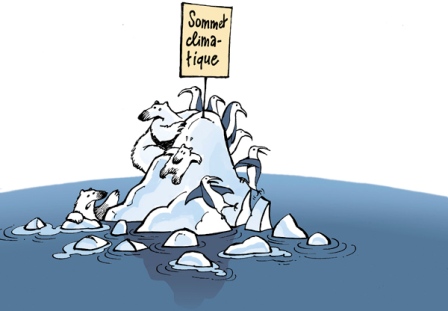| Warning: The original language in which this blog is written is either French or English. The automated translation may be imperfect. Readers are invited to refer to the original version of each post. |
|
|

L'actualité du capital social, de la vie en société et des options de société.

|
|
– Conference on climate: the involvement of NGOs |
|
|
|

Civil society unleashes its activists into battle
The Copenhagen Climate Conference, how many participants? The organizers of the event, the UN and Danish authorities alike, had no idea late Sunday afternoon, a few hours before the inauguration ceremony. Their respective information services were happy to repeat that the complex where the meeting is to be held from December 7 to 18, the Bella Center, can hold 15,000 people at most but that the attendance is expected to be significantly higher given the registered number: 32,000 …How many of these will come? And if they all come, where will they stand? Mystery. “It will be like a nightclub,” dares a press officer. It’s going to go in and out a lot.” The overall participation figure is not the only unknown. No one could say yet on Sunday how many officials would be there to represent the 192 states around the world party to the process. One fact, however, seemed certain: the diplomats will be fewer in number than the “observers”, ie delegates from non-governmental organizations, universities, churches, etc., which a persistent rumor estimated at 19,000. If one last proof of the importance of the event was needed, this extraordinary influx of “ordinary citizens” provides it. After having long been the concern of scientists alone, global warming began to interest politicians at the end of the 1980s. Today, on the occasion of this 15th Conference of the Parties to the United Nations Framework Convention on Climate Change, climate change, a third actor is strongly asserting itself: civil society. This is because more and more people are taking stock of the phenomenon since the community of climatologists, represented by the Intergovernmental Panel on Climate Change (IPCC), declared themselves practically sure of the reality of warming and of human responsibility. And many citizens, grouped in hundreds of NGOs, want to avoid letting governments tackle the problem alone. A problem which, in their eyes, is leading the world to catastrophe and must be tackled with the greatest vigor. There are times, they think, and global warming is one, where politics is too serious a matter to be left to politicians. (Le Temps, Monday December 7, 2009)
 Thus, we are told, hundreds of non-governmental organizations have flocked to the Danish capital to oppose the fossil fuel lobby with a “citizens’ lobby”. There is no question of them leaving politicians free to procrastinate. It is rather a blessing, because the concept of this conference is very bureaucratic: organized by the UN – a perfectly governmental organization which brings together states, supposed to represent their respective countries – it first provides for a meeting of experts and official specialists, then heads of state and government. We can wonder how the latter will use the work of the former, since they will barely have had time to read it. Qualified voices have already been raised to say that a lack of agreement would be preferable to a convoluted result whose interpretation would take years. This type of large mass does not contain group dynamics, because there are too many people involved for real interaction to occur. We must therefore believe that the dice are loaded and that the decisions have already been made elsewhere. And if they were not, the risks of failure are great. Every time governments meet (climate conference, G20, European “summits”, etc.), civil society tends to intervene, and, in this case, this intervention takes on a massive character. This mobilization is going in the right direction and is also changing form: from demonstration to participation. However, citizen lobbying (pressure on governments) is insufficient. Direct and effective participation in decisions, in a form to be determined, as unbureaucratic and institutionalized as possible, would allow us to go further. Likewise, on a daily basis, we should not expect everything from governments. It is through individual or family choices in consumption, recycling and investment that the greatest progress will be made. You can do something: choose green energy, consume organic products, ask your suppliers for organic products and environmentally friendly processes. In this case, the market is likely to be stronger than the State… Thus, we are told, hundreds of non-governmental organizations have flocked to the Danish capital to oppose the fossil fuel lobby with a “citizens’ lobby”. There is no question of them leaving politicians free to procrastinate. It is rather a blessing, because the concept of this conference is very bureaucratic: organized by the UN – a perfectly governmental organization which brings together states, supposed to represent their respective countries – it first provides for a meeting of experts and official specialists, then heads of state and government. We can wonder how the latter will use the work of the former, since they will barely have had time to read it. Qualified voices have already been raised to say that a lack of agreement would be preferable to a convoluted result whose interpretation would take years. This type of large mass does not contain group dynamics, because there are too many people involved for real interaction to occur. We must therefore believe that the dice are loaded and that the decisions have already been made elsewhere. And if they were not, the risks of failure are great. Every time governments meet (climate conference, G20, European “summits”, etc.), civil society tends to intervene, and, in this case, this intervention takes on a massive character. This mobilization is going in the right direction and is also changing form: from demonstration to participation. However, citizen lobbying (pressure on governments) is insufficient. Direct and effective participation in decisions, in a form to be determined, as unbureaucratic and institutionalized as possible, would allow us to go further. Likewise, on a daily basis, we should not expect everything from governments. It is through individual or family choices in consumption, recycling and investment that the greatest progress will be made. You can do something: choose green energy, consume organic products, ask your suppliers for organic products and environmentally friendly processes. In this case, the market is likely to be stronger than the State…










|
|
|
|
|

